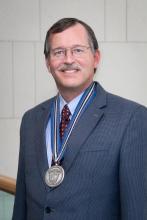During a virtual ceremony on December 4, Stan Gerson, interim dean for the School of Medicine, awarded Cliff Harding the Case Medal for Excellence in Health Science Innovation. Harding was recognized for his groundbreaking research, skilled department management, and deep dedication to his students with the highest honor bestowed by the School of Medicine.
“I had absolutely no idea this was coming,” said Harding, a Distinguished University Professor and Joseph R. Kahn Professor and Chair of the Department of Pathology at Case Western Reserve University (CWRU) and University Hospitals Cleveland Medical Center (UH). He also serves as Director of the Diagnostic Institute at UH, and Interim Chair of Anatomy at the School of Medicine.
Recruited to CWRU in 1993, Harding directs the research and clinical activities of hundreds of faculty staff in Case Western Reserve’s pathology department. With expertise spanning several medical disciplines including cancer, immunology, neuropathology, and basic and translational research, he also manages the clinical practice arm of his team at UH.
While in medical school at Washington University in St. Louis, Harding published a breakthrough manuscript that provided the first description of exosomes. Known to be universal in biology today, exosomes are small vesicles that promote a range of important cellular functions including transferring DNA, RNA, and proteins to other cells, thereby altering the function of the target cells as well as influencing the pathology of carcinogenesis and inflammation.
Harding’s manuscript has been cited over 2,750 times, and on the 30th anniversary of his discovery of exosomes, he was invited to author a retrospective in the Journal of Cell Biology on their discovery and importance. His research in recent years has included seminal publications in immunology in the areas of antigen processing and MHC function, and later, in immune evasion mechanisms in tuberculosis.
“Cliff has built his department into the tenth-best funded Pathology department in the U.S.,” Stan Gerson, interim dean for the School of Medicine, said. “He led our flagship MD/PhD-granting Medical Scientist Training Program for a generation of students, which remains one of the largest and most successful programs in the country. He also founded the Clinical and Translational Scientist Training Program through the CTSA, and its TL1 research training grant, providing comprehensive training for physicians, nurses, and dentists focusing on clinical and translational research.”
Find out more about Cliff Harding
1. What was the last book you read?
Although I don’t have much free time, I’m usually reading several books concurrently. One of the books I’m currently reading is Who We Are and How We Got Here: Ancient DNA and the New Science of the Human Past by David Reich. It’s about ancient DNA and using human genetic sequences to trace prehistoric migrations of humans. I’m also reading Steven Pinker’s The Better Angels of our Nature, a wide-ranging treatise about the reduction of violence in human societies over millennia.
2. When you were younger, what did you want to be when you grew up?
I’ve always wanted to be a scientist, and the academic setting appealed to me. My mother earned her PhD in 1948 and was a published researcher in developmental biology during an era where women weren’t welcomed into scientific careers. My dad was a cell biologist and ophthalmology researcher. Fun fact: My maternal grandmother was also an educator and was Dean of the College for Women at Western Reserve University from 1912-1914, and my grandfather was on the faculty here in Classics at that time.
My parents didn’t push me into science; I came to it on my own, but of course I was influenced by science in the family. At first, I wanted to be a physicist, but switched to neurobiology in college and my early graduate school work, then to cell biology for my PhD, and to pathology and immunology during my residency and postdoctoral training.
3. If you could have a superpower, what would it be?
I would like to have the superpower to bring people with opposing viewpoints together to agree on rational compromises. We are living in an increasingly polarized society. I’d like to be “The Convincer” of compromise and common agreement.
4. Who has had the greatest influence on you?
Both my parents influenced me greatly, as has my wife, Mina Chung, who is an NIH-funded cardiologist and researcher at Cleveland Clinic. Scientifically, I was influenced by three important mentors: Philip Stahl, John Heuser and Emil Unanue. At Case Western Reserve, I have had many great collaborators in both research, especially Henry Boom, chief of the division of infectious diseases and HIV medicine, and research education programs, especially George Dubyak and Derek Abbott.
5. What’s your favorite thing about Case Western Reserve?
The people here—students, faculty and staff —are inspirational. The atmosphere at the school is very special, nurturing collegial and collaborative relationships. In the programs I have helped to develop, I’ve had the pleasure of working with exceptional colleagues and trainees.


